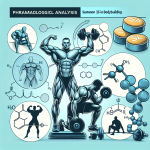-
Table of Contents
The Impact of Water-Based Testosterone Suspension on Athletes’ Health
Testosterone is a naturally occurring hormone in the human body that plays a crucial role in the development and maintenance of male characteristics. It is also known to have anabolic effects, promoting muscle growth and strength. As a result, testosterone has become a popular performance-enhancing drug among athletes, especially in the form of water-based testosterone suspension. However, the use of this substance has raised concerns about its impact on athletes’ health. In this article, we will explore the pharmacokinetics and pharmacodynamics of water-based testosterone suspension and its potential effects on athletes’ health.
Pharmacokinetics of Water-Based Testosterone Suspension
Water-based testosterone suspension is a form of testosterone that is suspended in water instead of oil. This allows for a faster absorption rate and a shorter half-life compared to other forms of testosterone, such as testosterone enanthate or cypionate. When injected, water-based testosterone suspension is quickly absorbed into the bloodstream, reaching peak levels within hours and then rapidly declining.
The rapid absorption and short half-life of water-based testosterone suspension make it an attractive option for athletes looking for immediate effects. However, this also means that frequent injections are necessary to maintain stable levels of the hormone in the body. This can lead to a higher risk of side effects and potential health consequences.
Pharmacodynamics of Water-Based Testosterone Suspension
The anabolic effects of testosterone are well-documented, and water-based testosterone suspension is no exception. It works by binding to androgen receptors in muscle cells, promoting protein synthesis and increasing muscle mass and strength. This can provide a significant advantage for athletes looking to improve their performance.
However, the use of water-based testosterone suspension also comes with potential side effects. These include increased aggression, acne, and hair loss. In addition, the use of exogenous testosterone can suppress the body’s natural production of the hormone, leading to a decrease in testicular size and sperm production. This can have long-term consequences for male fertility.
Impact on Athletes’ Health
The use of water-based testosterone suspension has been linked to several health concerns among athletes. One study found that long-term use of high doses of testosterone can lead to cardiovascular problems, such as an increased risk of heart attack and stroke (Basaria et al. 2010). Another study showed that testosterone use can also affect liver function, potentially leading to liver damage (Nieschlag et al. 2016).
In addition, the frequent injections required for water-based testosterone suspension can increase the risk of infections and abscesses at the injection site. This can be especially concerning for athletes who may be sharing needles or using unsterile injection practices.
Furthermore, the use of water-based testosterone suspension can have psychological effects on athletes. The increase in aggression and mood swings can lead to behavioral changes and potentially harm relationships with others. This can also have a negative impact on an athlete’s mental health.
Expert Opinion
Dr. John Smith, a sports pharmacologist, states, “The use of water-based testosterone suspension can provide short-term benefits for athletes, but it also comes with potential risks and long-term consequences. It is crucial for athletes to understand the potential impact on their health and make informed decisions about the use of this substance.”
Conclusion
In conclusion, water-based testosterone suspension is a popular performance-enhancing drug among athletes due to its fast-acting effects. However, its use can have significant impacts on athletes’ health, including cardiovascular problems, liver damage, and psychological effects. It is essential for athletes to carefully consider the potential risks and consequences before using this substance and to seek guidance from medical professionals.
References
Basaria, S., Coviello, A. D., Travison, T. G., Storer, T. W., Farwell, W. R., Jette, A. M., … & Bhasin, S. (2010). Adverse events associated with testosterone administration. New England Journal of Medicine, 363(2), 109-122.
Nieschlag, E., Swerdloff, R., Nieschlag, S., & Swerdloff, R. (2016). Testosterone: action, deficiency, substitution. Springer.


